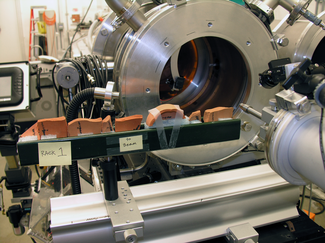Synthesis in Pottery Analysis: The Technical as a Portal to the Social
This article first appeared in ISAW Newsletter 17, Winter 2017.
Workshop, organized by Alan Greene (ISAW Visiting Research Scholar) and Yitzchak Jaffe (ISAW Visiting Assistant Professor)
 Experimental pottery set up for analysis at Argonne National Laboratory’s Advanced Photon Source synchrotron outside Chicago. Photo courtesy of Alan Greene.
Recent years have seen dramatically increased attention to both the technical study of archaeological pottery and to instrumental technique development that targets ever more efficient and accurate methods of investigation. This research has enhanced our understanding of an impressively diverse set of production, distribution, use, and disposal aspects, yet these studies have most consistently focused on inferring the overall properties of the vessels themselves—such as mineral content, firing temperature, and thermal shock resistance—while remaining more muted on the social and cultural implications that such observations suggest for the communities who made and used ceramic containers. A smaller community of scholars, however, has begun to marshal this growing set of methods, and to introduce several of their own, in order to answer social, cultural and political questions of global significance, ones that go beyond the technical parameters of pots themselves and investigate the lives and societies of their associated human populations. This workshop will bring together researchers who are combining the technical capacities of new laboratory methods with archaeology’s traditional tools of interpretation to achieve a new kind of techno-social synthesis. Please note that the workshop will not be open to the general public; attendance at the workshop will be limited to invited academic guests only. For more information, please contact the workshop organizers.
Experimental pottery set up for analysis at Argonne National Laboratory’s Advanced Photon Source synchrotron outside Chicago. Photo courtesy of Alan Greene.
Recent years have seen dramatically increased attention to both the technical study of archaeological pottery and to instrumental technique development that targets ever more efficient and accurate methods of investigation. This research has enhanced our understanding of an impressively diverse set of production, distribution, use, and disposal aspects, yet these studies have most consistently focused on inferring the overall properties of the vessels themselves—such as mineral content, firing temperature, and thermal shock resistance—while remaining more muted on the social and cultural implications that such observations suggest for the communities who made and used ceramic containers. A smaller community of scholars, however, has begun to marshal this growing set of methods, and to introduce several of their own, in order to answer social, cultural and political questions of global significance, ones that go beyond the technical parameters of pots themselves and investigate the lives and societies of their associated human populations. This workshop will bring together researchers who are combining the technical capacities of new laboratory methods with archaeology’s traditional tools of interpretation to achieve a new kind of techno-social synthesis. Please note that the workshop will not be open to the general public; attendance at the workshop will be limited to invited academic guests only. For more information, please contact the workshop organizers.